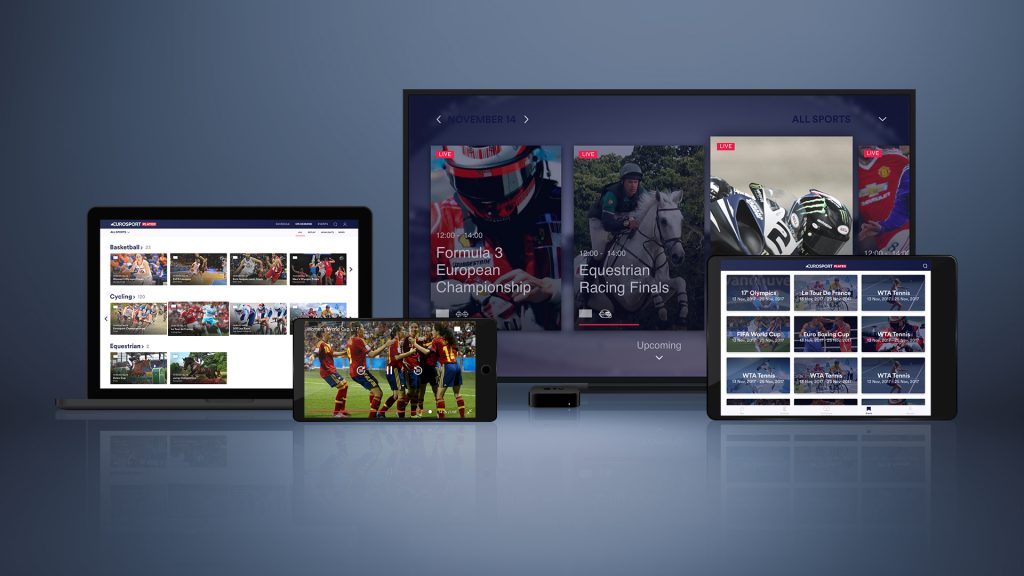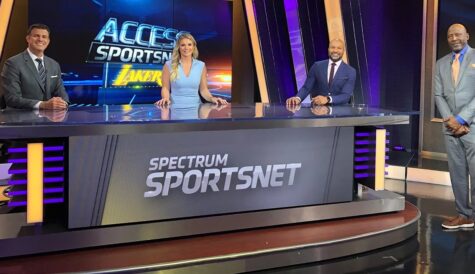
After more than 40 years of operation, DTVE is closing its doors and our website will no longer be updated daily. Thank you for all of your support.
Kicking and Streaming
 Live streaming, including of major sports events, is becoming increasingly popular, but the technical challenges of delivering a high-quality service at scale remain considerable. Anna Tobin reports.
Live streaming, including of major sports events, is becoming increasingly popular, but the technical challenges of delivering a high-quality service at scale remain considerable. Anna Tobin reports.
OTT providers have been streaming live content for years now, but more often than not, the experience has been – frankly – bad.
With audiences increasingly expecting live streaming quality to match the highest live broadcast quality, there is growing pressure on OTT providers to deliver. Live OTT content is known for buffering, latency and system crashes. Will it ever literally get up to speed?
From a picture quality perspective, it is highly likely that the quality of OTT video is already as good as, if not better than, broadcast quality, claims Steve Miller-Jones, VP product strategy at Limelight Networks. “Certainly, with VOD content and most modern large and small form-factor screens, OTT video quality can be indistinguishable from broadcast picture quality, and where linear channels have not invested in or completed digital transformation projects yet, will be exceeding it already,” he says.
It’s when OTT goes live, however, that Miller-Jones admits that its quality can take a hit. “Live events pose different challenges to the OTT delivery workflows than VOD content libraries, and while picture quality can still be high, the overall quality of experience of the event, not just the video, is where the focus is today.
“Reducing and removing rebuffering issues while watching the streams, while maintaining high bitrates throughout the event, regardless of where the user is and what device they are watching on, are critical issues to solve in order to maintain user satisfaction with OTT services.”
These glitches need to be ironed out, because OTT is increasingly finding its place on the main living room TV, not just second screens. Nivedita Nouvel, VP of marketing at Broadpeak highlights the challenge: “If the industry wants to mutualise investments and have one solution that fits all screens, the first step is defining ‘broadcast quality’,” she says. “Broadcast quality encompasses providing a fixed video quality, i.e. a single bitrate for all, with a quality that depends on the channels, from SD to 4K with UHD and HDR; continuity of service, with no rebuffering; and low latency, below 5s.”
Nouvel continues: “For live OTT services, the adaptive bitrate and hence the video quality depends on the state of the networks, i.e. backbone and local. An OTT service can be considered as equivalent to broadcast if the higher profiles are available and can be reached thanks to an optimised network.”
Working for Discovery, Europe’s second largest broadcaster, across all platforms and overseeing Eurosport Player, the only Europe-wide sport streaming service, Gordon Castle, senior VP, technology and operations at Eurosport, is uniquely placed to understand all the challenges faced by both broadcasters and OTT operators. He says that multi-platform production and distribution brings additional layers of complexity, given the significant variations between linear broadcast and OTT.
“From the consumer viewpoint, some audiences are transitioning to streaming with similar viewer expectations, but more widely streaming audiences expect a different experience. This means simply sending out the same content on both types of service is not appropriate,” he says. “At Eurosport, we meet this challenge by having one unified team managing the content and delivery requirements for both linear and digital. We are able to plan and tailor the experiences we offer by audience and the screen they’re choosing to watch.”
Traditional broadcasters are keen to get a foothold in the OTT market so that they can offer the best of both worlds. However, doing so requires substantial investment.
It’s all about scale, says Thierry Fautier, VP of video strategy at Harmonic. “First, broadcasters need to deploy technology that allows them to stream live content at scale,” he explains. “Next, they need to deploy their app across multiple devices, including phones – HLS and Android – tablets, web browsers – Edge, Chrome, Safari, Firefox – connected TVs and game consoles. This is a lot of work, and they also need to keep it profitable.”
With traditional DTH subscribers now increasingly moving over to OTT, satellite operators are particularly keen to infiltrate the space, says Antonio Corrado, CEO of streaming technology specialist MainStreaming.
“The demand to move content from satellite to online is increasing rapidly as the cost drops and quality rises. This is what we’ve been helping Sky with in Italy, as they push to stream video with the best quality of experience to their subscribers with their existing offering, as well as with new services,” he says.
The biggest challenge for broadcasters is extending the capability to provide content in an IP environment, alongside having to create a means of offering the streaming service to consumers, says Tim Pearson, senior director, product marketing at Nagra. “For example, they may need to create an app through which to present the content, which may have to be replicated onto many device types,” he says. “Equally, piracy forms a key concern for streaming broadcasting alongside requirements for device authentication and secure session management, to ensure that only those paying a subscription have access to the service.”
Broadcasters have several options if they want to address multiscreen, adds Nouvel. “One approach is to set up a pure OTT service relying on a CDN service provider, dedicated to multiscreen. The drawbacks are that broadcasters have no control over the quality of experience, incur expensive CDN costs, with high volumes related to the usage of unicast even for live channels, and there are two different setups for main screen and mobile screen delivery,” she says. “Another method that broadcasters can take is to rely on the partnerships with network operators, and possibly implement multicast ABR for live, with a local cache in the network. The benefits are improved QoE, along with controlled costs thanks to multicast ABR and local caching. Ideally, broadcasters should try to mix local caches with a CDNaaS in order to maximise availability. Finally, satellite operators can directly implement multicast ABR down to home STBs and have a single solution to address all screens. VOD use cases can be handled by pushing some content in the local STB.”
The technical obstacles are not the only problems that broadcasters need to overcome when creating an OTT channel, says Ian Munford, director of product marketing and enablement, media, EMEA at Akamai. “As each country is uniquely different in terms of its internet infrastructure and regulatory environment, these challenges can vary greatly from country to country,” he explains. “Moreover, broadcasters in Europe operate across a variety of different rights holdings and business models be that ad funded, licence funded or pay TV, which also introduce challenges for their streaming services and, in many cases, it is these commercial challenges which present the biggest hurdles.”
Added to all of these obstacles standing in the way of perfect live OTT delivery, there are also problems that the OTT provider cannot control: the size of the pipe transporting the content to the consumer and whether the device is optimised to receive high quality content.
Surges in demand
It is sudden unexpected surges in demand for live content, such as the recent surprise success of the Women’s Football World Cup, that puts undue strain on OTT services, and means that operators have to scale up bandwidth rapidly.
Internet bandwidth capacity, the penetration rates of global high-speed mobile devices and delivery optimisation, all come into play when having to scale up at speed, but these challenges are all being tackled by technology, says Castle. “While these are challenges the industry has to overcome today, the growth of internet connectivity and the evolution of associated technology is continuing to enable the expansion of delivery via OTT services. The roll out of 5G and future advancements to come should only help overcome such obstacles in the future,” he says.
Planning is key to dealing with any unexpected demand loads, says Munford. “Our experience in delivering large sporting events shows that careful scenario planning and robust testing can ensure any event can be delivered,” he says. “At this year’s IPL cricket final, we delivered more than 18 million concurrent streams to a highly demanding audience and this was only achieved through close collaboration and planning.
“We always encourage our customers to thoroughly test the entire technical workflow with a service that will emulate exact audience peaks, the audience or fan location and with the ability to dynamically control testing parameters. This will help identify any issues across the technical workflow, including delivery.”
Typically, in a major sports event there are a number of key points during the match where demand surges. Being aware of this is vital for planning, points out Pearson. “Five minutes before the start, if there is a goal or incident, half time breaks and the final five minutes.
“These peaks in demand require an operator’s platform to have the necessary network and peak-load capacity in key areas, such as authentication, authorisation, licence delivery and CDN playout.”
Managed networks are the answer to scaling live OTT, reiterates Fautier. “Today, the scaling is done either by increasing the CDN capacity, therefore the cost, or putting edge caches in the ISP network, to reduce cost and increase QoE,” he says. “One other way to scale live OTT is to carry the traffic across multicast lanes used today in IPTV. Think, for example, about the BBC renting a fast lane to BT and delivering its iPlayer to the home though a gateway managed by BT, which will convert it locally to unicast. This might have seemed like a science-fiction model a few years back, but it’s getting more and more attention. To be successful, this will require a business relationship between OTT providers and ISPs. It might take time to establish, but it could be a simple and cost-effective way to scale live OTT.”
Playing to multiple formats
To further complicate things, to achieve maximum success, OTT content needs to be playable in multiple formats. To accommodate this, OTT providers have had to become adept at managing transitions between multiple bit-rates and multiple formats.
“Multi-rate is a well-mastered technology, both on the server and client side. What is still a work in progress is the client behaviour when the bitrate gets scarce,” says Fautier. “Multi-f ormat is mostly a content preparation and a player issue. To optimise the delivery cost, you need to encode into a multi-bitrate TS format, which is fed to an origin server that will make the live content available in multiple delivery formats (i.e., HLS and DASH). But you also need to protect the content using a DRM technology, which starts to complicate matters, as each format can have a different DRM. Today there are three major DRM technologies: Apple FairPlay, Google Widevine and Microsoft PlayReady, which can be used with each delivery format. With CMAF (Common Media Application Format), we now have a single file format that can be encrypted with the Common Encryption (CENC) and two encryption schemes CBC (for HLS) and CTR (for DASH). However, as some players can only decrypt one encryption scheme, you still have to store two copies in the CDN when content is encrypted. We think over time there will be convergence, on new players, to one single encryption format (CBCS), as the three DRM families have announced CBCS support for their new release.”
ormat is mostly a content preparation and a player issue. To optimise the delivery cost, you need to encode into a multi-bitrate TS format, which is fed to an origin server that will make the live content available in multiple delivery formats (i.e., HLS and DASH). But you also need to protect the content using a DRM technology, which starts to complicate matters, as each format can have a different DRM. Today there are three major DRM technologies: Apple FairPlay, Google Widevine and Microsoft PlayReady, which can be used with each delivery format. With CMAF (Common Media Application Format), we now have a single file format that can be encrypted with the Common Encryption (CENC) and two encryption schemes CBC (for HLS) and CTR (for DASH). However, as some players can only decrypt one encryption scheme, you still have to store two copies in the CDN when content is encrypted. We think over time there will be convergence, on new players, to one single encryption format (CBCS), as the three DRM families have announced CBCS support for their new release.”
Keeping watch
Being proactive and monitoring the OTT user experience is crucial to being able to spot and if possible fix problems before the user becomes aware of them.
“Critical metrics include video re-buffer rate, rate of error and bitrate sustained during playback,” says Miller-Jones. “In addition to this, metrics from the player are able to help broadcasters understand how successful their content is, with metrics like viewing time, drop-off rate and drop-off time being critical to understanding ROI on content and rights investments.”
Authenticating sign in
For live OTT providers keeping track of who is using their services is vital to maximising advertising and subscription revenues and stopping piracy.
“Increasingly the role of single-sign-on is addressing service authentication challenges,” explains Pearson. “Other such challenges exist with late registration for PPV content, an example being where a live PPV sports event is due to start shortly and new subscribers register to watch within the final few minutes before the game. Business rules have to be set to ensure the need to validate and collect payment is matched with the viewer’s immediate requirement to watch the content.”
To effectively authenticate viewers in a sport environment, you must be able to manage concurrency peaks during the live event, says Liz Goulding, VP of product at Eurosport Digital.
“Building scale is essential, she says. “The ability to scale during these time periods is key to ensuring a smooth customer journey and experience,” she says. “In Europe, additional considerations have been added by EU-portability and GDPR rules, but bring significant advantages with additional viewing opportunities and protections for users.”
Slipping in the ads
OTT is particularly well suited to personalised ads and so this is one area that most OTT providers are intent on tapping, particularly where they are offering content for free.
“Our starting point is always the consumer,” says Goulding. “Advertising has to be personally relevant and meaningful, delivered at the right time and supportive to the customer experience. We are seeing the technology around dynamic ad insertion mature rapidly, which is something we’re monitoring closely.”
Adapted bitrate technologies are great tools for simplifying personalised ad insertion for OTT, adds Nouvel. “There’s no longer a need to perform complex splicing at the video level; content insertion and replacement can be handled through manifest manipulation. The benefit of a server-side solution over a player-side system is that the ad insertion is seamless,” she says.
“Ad blockers cannot identify the specificity of the ad and hence cannot block it, since it is served in the same session as the original content. For live channels, the usage of SCTE-35 and VAST technologies enable triggers to be added in the stream and used in a timely manner.”
Server-side ad insertion (SSAI) is the winning architecture for serving ads to OTT content, agrees Fautier.
“With SSAI solutions, all ads are ingested and transcoded to typically match the bitrates and resolutions of the content. Content and ads are stitched together, in a frame-accurate way that guarantees the best QoE for end users,” he says. “No rebuffering, black screens waiting for the ad response, or player swaps during ad breaks to support exotic ad video codecs exist. These are all problems that can still be seen today with legacy methods of inserting ads at the client. Scalability can still be an issue, especially for popular live events. ADS can be overflowed by ad requests, which could cause the ADS to respond too late. Of course, prefetching ads is an option, but over time, we expect native cloud technologies to help ADS scale at will.”
With revenue streams into OTT increasing and the technology behind it and receiving it improving rapidly, the future of live OTT streaming is looking bright.
If the conditions are ideal, in some instances, live OTT content will surpass broadcast quality. Getting those conditions right, however, is not easy and often out of the OTT operator’s control.



